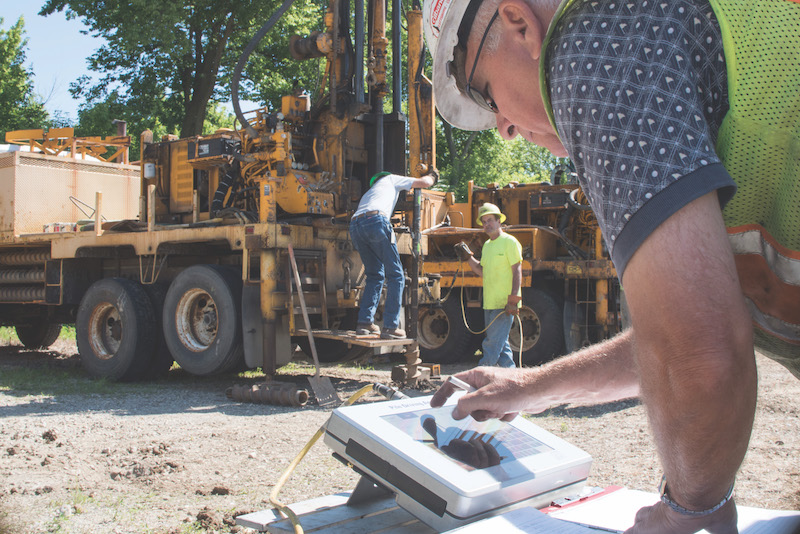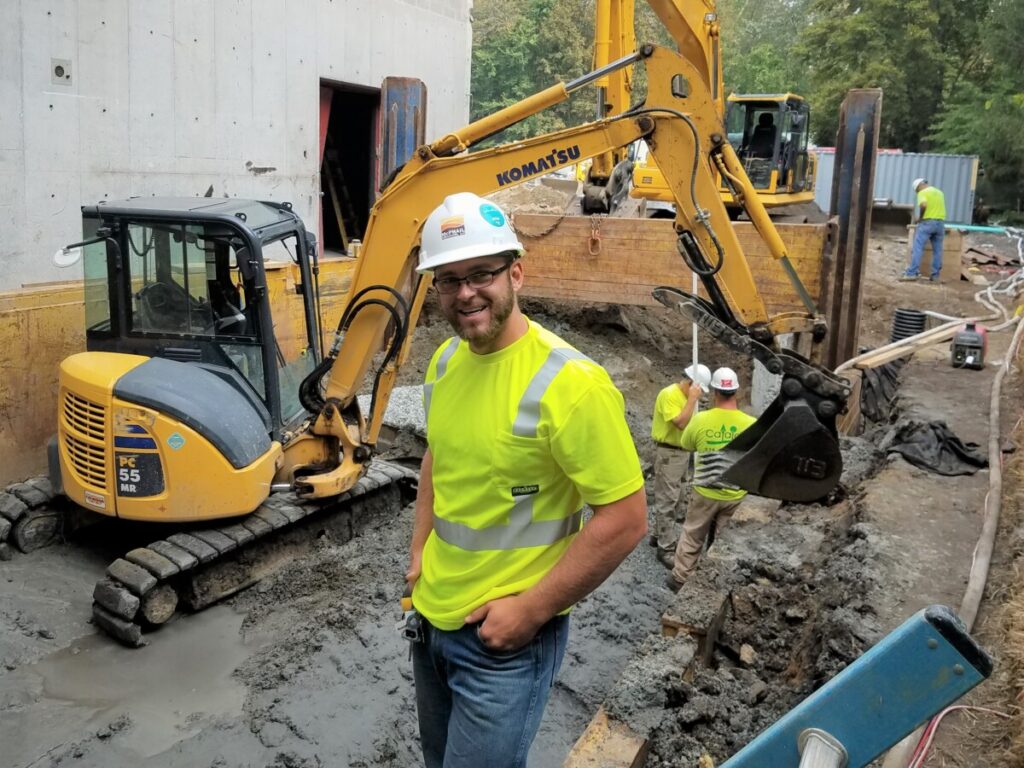Essential Abilities for Flourishing in the Geotechnical Industry Today
Essential Abilities for Flourishing in the Geotechnical Industry Today
Blog Article
A Thorough Summary of the Trick Obligations of Geotechnical Engineers in Website Characterization and Ground Improvement Strategies for Engineering Solutions
Geotechnical engineers are integral to the successful execution of design tasks, charged with the crucial duties of website characterization and the application of ground enhancement methods. Their job involves a thorough analysis of subsurface conditions, using various testing techniques to determine dirt and rock residential properties. This foundational knowledge not only notifies style decisions but additionally reduces prospective risks connected with ground instability. As we check out the complex duties of these specialists, it becomes evident just how their competence forms the security and efficiency of engineering options. What certain strategies and assessments attract attention in this crucial technique?
Function of Geotechnical Engineers
Geotechnical engineers play a pivotal function in the style and building and construction of infrastructure by analyzing the actions of dirt and rock below the surface - geo tech engineering. Their obligations encompass evaluating subsurface problems to inform design choices that ensure architectural stability and safety and security. By carrying out comprehensive evaluations of dirt properties, consisting of shear leaks in the structure, strength, and compressibility, geotechnical engineers give critical information that influences the selection of ideal building materials and methods
In addition to examining soil technicians, geotechnical engineers are tasked with recognizing prospective hazards such as landslides, sinkholes, and ground negotiations. Their knowledge aids alleviate dangers connected with these geotechnical sensations, therefore safeguarding both the environment and public security. They additionally work together closely with various other design disciplines, making certain that geotechnical considerations are integrated right into total project design.
Moreover, geotechnical designers participate in the analysis of existing structures, offering suggestions for retrofitting and repairs when necessary. Their detailed understanding of soil-structure communication is essential for the development of sustainable infrastructure services. In general, the function of geotechnical engineers is indispensable to the effective realization of building jobs, ensuring they are safe, resilient, and compliant with regulatory standards.

Website Characterization Processes
Reliable site characterization procedures are important for understanding the subsurface problems that influence task design and implementation. Geotechnical engineers employ an organized approach to gather, evaluate, and translate information concerning soil, groundwater, and rock attributes. This procedure starts with a detailed evaluation of existing literary works and archaeological site data, supplying understandings into previous site problems and possible challenges.

Information analysis follows fieldwork, where designers use geostatistical methods to analyze searchings for and create geological versions. This modeling aids in identifying prospective geohazards, such as landslides or liquefaction, which are vital for danger assessment. Ultimately, the results inform design referrals, guaranteeing that design options are both secure and efficient. With attentive website characterization, geotechnical engineers prepared for successful task implementation, decreasing unpredicted issues and enhancing source allotment.
Soil and Rock Testing Methods
While comprehending subsurface problems is crucial, the choice of appropriate soil and rock testing techniques is just as vital for exact evaluation and design. Geotechnical engineers use a variety of testing methods to review the physical and mechanical buildings of soil and rock materials.
Research laboratory tests, such as Atterberg limits, grain dimension evaluation, and unconfined compressive strength examinations, supply important information on soil actions under different wetness problems and filling scenarios. These tests assist establish soil category and predict settlement or shear strength qualities essential for structure design.
In-situ testing methods, including Criterion Infiltration Tests (SPT), Cone Infiltration Examinations (CPT), and pressure meter examinations, enable engineers to collect data directly from the ground. These methods offer important insights into the soil's density, consistency, and stratification without the need for substantial tasting.
Rock screening commonly includes core tasting and laboratory evaluation to examine residential or commercial properties like uniaxial compressive strength and rock top quality designation (RQD) Together, these dirt and rock testing approaches allow geotechnical engineers to make enlightened decisions regarding site-specific obstacles, making certain the safety and security and stability of engineering remedies.
Ground Enhancement Strategies
Ground renovation strategies are necessary for boosting the engineering homes of dirt, therefore boosting its load-bearing ability and reducing negotiation. These approaches are crucial in dealing with challenges offered by weak or bothersome soils, which can considerably influence have a peek at this site the security and sturdiness of frameworks.
Numerous ground enhancement strategies are employed, consisting of compaction, grouting, and dirt stabilization. Compaction includes raising the density of soil with mechanical methods, which improves its shear stamina and lowers compressibility. Grouting, on the other hand, entails injecting a fluid product into the ground to load gaps and enhance dirt communication. This technique is specifically effective for treating loosened sands or broken rock.
Dirt stabilization includes a variety of methods, from chemical ingredients to mechanical treatments, aimed at enhancing the soil's resistance to disintegration and contortion. Strategies such as lime stablizing or cement blending change the residential properties of the dirt at a particle degree, boosting its total efficiency.
Importance of Geotechnical Analyses
Geotechnical evaluations play a crucial duty in the preparation and style of engineering jobs, as they give crucial info about the subsurface problems. Comprehending soil residential properties, rock formations, groundwater degrees, and potential geohazards is vital for ensuring the security and safety of frameworks. These evaluations enable designers to make informed choices pertaining to website selection, layout parameters, and construction methodologies.
The relevance of geotechnical evaluations expands beyond first job stages; they are critical in risk monitoring and price efficiency. By recognizing potential problems early, such as soil negotiation, slope instability, or extreme groundwater, designers can create proper reduction methods, reducing the possibility of architectural failings and costly delays. These analyses sustain compliance with governing requirements and improve the sustainability of design practices.

Final Thought
To conclude, geotechnical engineers are vital to making certain the security and security of engineering jobs via detailed website characterization and ground enhancement methods. civil consulting engineers. Their methodical strategy to evaluating subsurface problems, integrated with their recommendations for efficient ground modification, considerably boosts soil residential properties and load-bearing capacity. The experience of geotechnical engineers not just facilitates informed job preparation yet likewise guarantees conformity with policies and fosters reliable communication among stakeholders, ultimately adding to effective engineering end results
Geotechnical engineers play an essential role in the design and building and construction of infrastructure by assessing the actions of soil and rock underneath the surface. By carrying out in-depth evaluations of dirt homes, consisting of shear compressibility, toughness, and leaks in the structure, geotechnical engineers provide critical data that affects the option of ideal building and construction materials and techniques.
In addition to analyzing dirt technicians, geotechnical engineers are entrusted with recognizing possible dangers such as landslides, sinkholes, and ground settlements. visit our website Geotechnical designers use a systematic strategy to gather, evaluate, and analyze data concerning dirt, rock, and groundwater qualities. By identifying potential concerns early, such as soil negotiation, incline instability, or extreme groundwater, engineers can design proper mitigation techniques, reducing the likelihood of costly hold-ups and structural failures.
Report this page